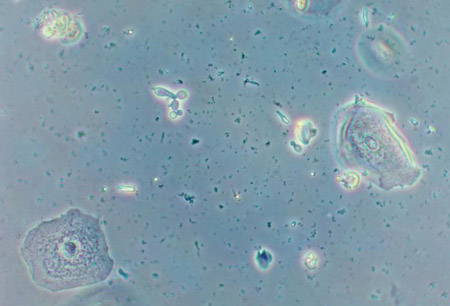Summary
Diferenciales
Común
- Bacterial vaginosis
- Trichomoniasis
- Vulvovaginal candidiasis
- Chlamydia trachomatis infection
- Neisseria gonorrhoeae infection
- Mycoplasma genitalium
- Irritant and allergic vaginitis
- Physiologic discharge in adults
- Foreign body in children
- Nonspecific vaginitis
- Physiologic discharge in children
Infrecuente
- Herpes simplex virus (HSV) infection
- Streptococcal vaginitis in adults
- Genital schistosomiasis
- Entamoeba gingivalis plus intrauterine device (IUD)
- Inadequate hygiene
- Foreign body in adults
- Combined contraceptive or hormonal vaginal ring-related
- Genitourinary syndrome of menopause
- Postpuerperal atrophic vaginitis; lochia
- Behcet syndrome
- Desquamative inflammatory vaginitis
- Erosive lichen planus
- Postoperative sling/mesh procedure
- Postradiation
- Cervical cancer
- Carcinoma of the fallopian tube
- Pinworm infection
- Streptococcal vaginitis in children
- Sexual abuse
- Transmitted maternal birth canal infection
- Prolapsing fibroid
- Vaginal fistula
- Lymphoma of genital tract
Colaboradores
Autores
Jenell S. Coleman, MD, MPH, FACOG
Associate Professor
Division Director, Gynecologic Specialties
Medical Director, JHOC Women’s Health Center
Director, JHOC Resident Continuity Clinic
Co-Director, JHOC Colposcopy Clinic
Department of Gynecology & Obstetrics
Johns Hopkins University School of Medicine
Baltimore
MD
Divulgaciones
JC is an author of a reference cited in this topic and received research grants from Hologic, Gilead, and Merck.
Agradecimientos
Dr Jenell Coleman would like to gratefully acknowledge Dr Veronica Gomez-Lobo and Dr Isabelle Guichard, previous contributors to this topic.
Divulgaciones
VGL and IG declare that they have no competing interests.
Revisores por pares
Susie Logan, MB ChB, MD, FRCOG, FFSRH
Senior Consultant, Department of Obstetrics and Gynaecology, National University Hospital, NUHS
Director of Residency Obstetrics and Gynaecology, National University Hospital, NUHS
Co-Lead for Women's Health, Alexandra Hospital
Assistant Professor, National University of Singapore
Singapore
Divulgaciones
SL is a member of the Examination Committee of the Membership of the Faculty of Sexual and Reproductive Healthcare of the Royal College of Obstetricians and Gynaecologists.
David Chelmow, MD
Chair
Department of Obstetrics and Gynecology
Virginia Commonwealth University
Richmond
VA
Divulgaciones
DC declares that he has no competing interests.
Lesley Bacon, FFSRH, MRCGP
Consultant in Sexual and Reproductive Health
Lewisham Primary Care Trust
Waldron Health Centre
London
UK
Divulgaciones
LB was a member of the group that produced the 2006 Faculty of Sexual and Reproductive Health guidance on the management of women with vaginal discharge presenting in a non-genitourinary setting.
Agradecimiento de los revisores por pares
Los temas de BMJ Best Practice se actualizan de forma continua de acuerdo con los desarrollos en la evidencia y en las guías. Los revisores por pares listados aquí han revisado el contenido al menos una vez durante la historia del tema.
Divulgaciones
Las afiliaciones y divulgaciones de los revisores por pares se refieren al momento de la revisión.
Referencias
Artículos principales
Centers for Disease Control and Prevention. Sexually transmitted infections treatment guidelines, 2021. Jul 2021 [internet publication].Texto completo
Sherrard J, Wilson J, Donders G, et al. 2018 European (IUSTI/WHO) International Union against sexually transmitted infections (IUSTI) World Health Organisation (WHO) guideline on the management of vaginal discharge. Int J STD AIDS. 2018 Nov;29(13):1258-72. Resumen
Miller JM, Binnicker MJ, Campbell S, et al. Guide to utilization of the microbiology laboratory for diagnosis of infectious diseases: 2024 update by the Infectious Diseases Society of America (IDSA) and the American Society for Microbiology (ASM). Clin Infect Dis. 2024 Mar 5:ciae104.Texto completo Resumen
Artículos de referencia
Una lista completa de las fuentes a las que se hace referencia en este tema está disponible para los usuarios con acceso a todo BMJ Best Practice.

Folletos para el paciente
Chlamydia
Genital herpes
Más Folletos para el pacienteInicie sesión o suscríbase para acceder a todo el BMJ Best Practice
El uso de este contenido está sujeto a nuestra cláusula de exención de responsabilidad